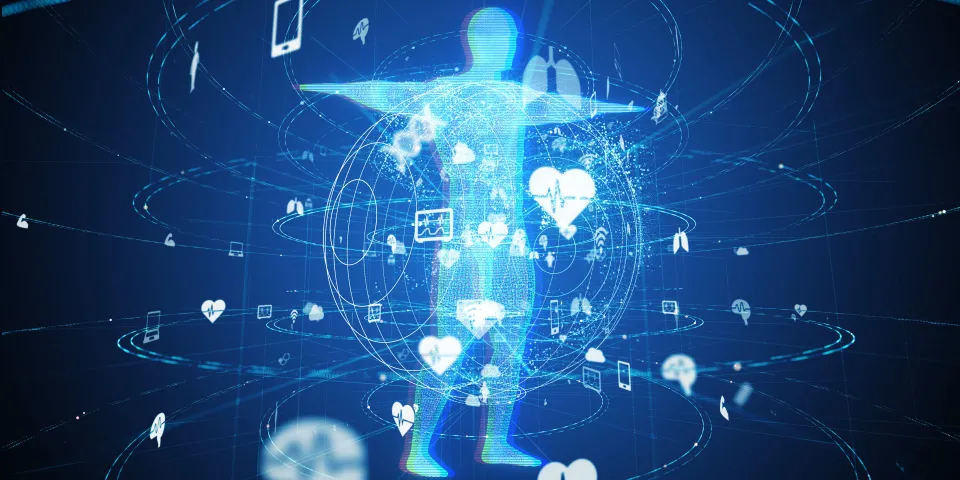Latest
Embracing the Future: The Impactful Intersection between Technology and Healthcare
Jun 13, 2023

Just as a patient and a healthcare provider benefit from a collaborative relationship, the connection between the technology and healthcare fields promotes growth, inclusivity and expansion at a rapid rate. In a world where technology drives innovation and healthcare strives for better patient outcomes, the intersection between these two fields is becoming increasingly crucial to the future of healthcare. The shortage of healthcare professionals continues to impact communities around the country, with America facing a shortage of up to 124,000 physicians by 2033, resulting in the need to hire at least 200,000 nurses per year to meet increased demand.
While traditionally seen as separate entities, healthcare and technology are now colliding, forming a symbiotic relationship that holds immense potential for the future of healthcare. By exploring the profound impact of technology on healthcare and the collaboration between these domains, we are in a better position to revolutionize the way we deliver and receive healthcare services.
Technology's Impact on Healthcare:
- Enhanced Diagnostics and Treatment: Technology has revolutionized diagnostics and treatment options, leading to improved accuracy and outcomes. Innovative tools such as medical imaging devices, wearable sensors, and genetic testing enable healthcare professionals to diagnose diseases earlier, personalize treatments, and monitor patient progress more effectively. These advancements have the potential to save lives and improve quality of life.
- Telemedicine and Remote Patient Monitoring: Telehealth options have revolutionized healthcare experiences for both providers and patients. What started as a necessity in the thick of COVID protocols has created opportunities for more inclusive and accessible treatment for patients nationwide. With the help of video consultations, remote monitoring devices, and mobile health applications, healthcare providers can now reach patients in remote areas and offer virtual care. This has significantly increased access to healthcare services, reduced costs, and enhanced convenience for patients.
- Data Analytics and Predictive Modeling: The healthcare industry generates vast amounts of data every day. As a result, technology has provided the tools to harness its power. Through data analytics and predictive modeling, healthcare professionals can extract valuable insights, identify trends, and make informed decisions. This data-driven approach improves patient care, enables early intervention, and enhances population health management.
Careers Connecting Technology and Healthcare
The intersection of technology and healthcare has given rise to a wide range of job opportunities that blend expertise in both fields, including:
- Health Informatics Specialist: Health informatics specialists play a crucial role in managing and analyzing healthcare data through IT. They are responsible for developing and maintaining electronic health record (EHR) systems, ensuring data accuracy, privacy, and security. They work on designing data collection systems, implementing data standards, and optimizing data workflows to improve the efficiency of healthcare information management.
- Medical Software Developer: Medical software developers create and maintain software applications specifically designed for the healthcare industry. They work on clinical decision support tools, telemedicine platforms, mobile health applications, and other software solutions that enhance healthcare delivery, improve patient outcomes, and streamline administrative processes.
- Telehealth Specialist: Telehealth specialists focus on the implementation and management of telehealth programs. They facilitate virtual healthcare visits, coordinate remote patient monitoring systems, and ensure the smooth operation of telemedicine platforms. Their expertise lies in utilizing technology to enable remote patient care, connecting patients and healthcare providers regardless of geographical barriers.
- Biomedical Engineer: Biomedical engineers contribute to the development and maintenance of medical equipment and devices. They design, test, and modify medical instruments, imaging systems, prosthetics, and other technological solutions used in healthcare settings. Their work ensures the safety, functionality, and effectiveness of medical devices that directly impact patient care.
The intersection between technology and healthcare represents a remarkable fusion of two domains, each bringing unique strengths and opportunities to the table. As this relationship continues to evolve, we can anticipate continuous advancements that will reshape the healthcare landscape into the future.
By embracing technology and leveraging its potential, we can strive for a future where compassionate care and cutting-edge technology go hand in hand, empowering both patients and healthcare professionals alike. Herzing University is proud to offer comprehensive degree pathways for those interested in both technology and healthcare, allowing you to play an instrumental role during this exciting time.
Learn More About Our Career Programs
Bureau of Labor Statistics (BLS), U.S. Department of Labor, Occupational Employment and Wage Statistics 2023 / Occupational Outlook Handbook 2022. BLS estimates do not represent entry-level wages and/or salaries. Multiple factors, including prior experience, age, geography market in which you want to work and degree field, will affect career outcomes and earnings. Herzing neither represents that its graduates will earn the average salaries calculated by BLS for a particular job nor guarantees that graduation from its program will result in a job, promotion, salary increase or other career growth.
Latest
Recent Blog Posts
Subscribe to our Newsletter
Get the latest news you need to know, from study hacks to interview tips to career advancement. Have it delivered right to your inbox biweekly.








